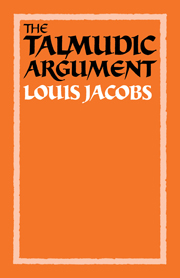Book contents
- Frontmatter
- Contents
- Preface
- Note on transliteration
- Note on Biblical translations
- Note on the Babylonian Talmud
- List of Abbreviations
- 1 The Talmudic argument
- 2 The literary form of the Babylonian Talmud
- 3 Berērah: retrospective specification
- 4 Yeúsh she-lo mi-da‘at: unconscious abandonment of property
- 5 Rubba: probability
- 6 Davar she-lo ba le-'olam: conveyance of a thing not yet in existence
- 7 Kol she-eyno be-zeh aḥar zeh afilu be-vat aḥat eyno: whatever cannot be established in a consecutive sequence cannot be established even in a simultaneous sequence
- 8 Yesh ḥoresh telem eḥad: a single act of ploughing can result in a number of penalties
- 9 Simanin de-oraita o de-rabbanan: whether reliance on distinguishing marks for the purpose of identification is Biblical or Rabbinic
- 10 Devarim she-be-lev eynam devarim: mental reservations in contracts are disregarded
- 11 Ḥazakah: presumptive state
- 12 Gadol kevod ha-beriot: the law and regard for human dignity
- 13 Hazmanah milta: whether the designation of an object for a particular use is effective
- 14 Mitzvat ‘aseh she-ha-zeman geramah: positive precepts dependent on time from which women are exempt
- 15 Heyzek she-eyno nikar: indiscernible damage to property
- 16 Kinyan ḥatzer: acquisition by means of a domain
- 17 Palginan be-dibbura: admission of part of a testimony even though another part of the same testimony is rejected
- 18 Tadir u-mekuddash: which takes precedence: the more constant or the more sacred?
- 19 Palga nizka: the nature of the payment of half-damages to which the owner of a goring ox is liable
- 20 Patur mi-diney adam ve-ḥayyav be-diney shamayim: cases where there is liability in the eyes of God even though the human courts cannot enforce payment
- 21 Maḥal ‘al kevodo kevodo maḥul: renunciation of honour by one to whom it is due
- 22 Conclusions
- Glossary
- Bibliography
17 - Palginan be-dibbura: admission of part of a testimony even though another part of the same testimony is rejected
Published online by Cambridge University Press: 06 January 2010
- Frontmatter
- Contents
- Preface
- Note on transliteration
- Note on Biblical translations
- Note on the Babylonian Talmud
- List of Abbreviations
- 1 The Talmudic argument
- 2 The literary form of the Babylonian Talmud
- 3 Berērah: retrospective specification
- 4 Yeúsh she-lo mi-da‘at: unconscious abandonment of property
- 5 Rubba: probability
- 6 Davar she-lo ba le-'olam: conveyance of a thing not yet in existence
- 7 Kol she-eyno be-zeh aḥar zeh afilu be-vat aḥat eyno: whatever cannot be established in a consecutive sequence cannot be established even in a simultaneous sequence
- 8 Yesh ḥoresh telem eḥad: a single act of ploughing can result in a number of penalties
- 9 Simanin de-oraita o de-rabbanan: whether reliance on distinguishing marks for the purpose of identification is Biblical or Rabbinic
- 10 Devarim she-be-lev eynam devarim: mental reservations in contracts are disregarded
- 11 Ḥazakah: presumptive state
- 12 Gadol kevod ha-beriot: the law and regard for human dignity
- 13 Hazmanah milta: whether the designation of an object for a particular use is effective
- 14 Mitzvat ‘aseh she-ha-zeman geramah: positive precepts dependent on time from which women are exempt
- 15 Heyzek she-eyno nikar: indiscernible damage to property
- 16 Kinyan ḥatzer: acquisition by means of a domain
- 17 Palginan be-dibbura: admission of part of a testimony even though another part of the same testimony is rejected
- 18 Tadir u-mekuddash: which takes precedence: the more constant or the more sacred?
- 19 Palga nizka: the nature of the payment of half-damages to which the owner of a goring ox is liable
- 20 Patur mi-diney adam ve-ḥayyav be-diney shamayim: cases where there is liability in the eyes of God even though the human courts cannot enforce payment
- 21 Maḥal ‘al kevodo kevodo maḥul: renunciation of honour by one to whom it is due
- 22 Conclusions
- Glossary
- Bibliography
Summary
The sugya is Sanhedrin 9b–10a and is in the form of a discussion around legal statements of the fourth-century Babylonian Amoraím R. Joseph and Rava. The term palginan be-dibbura means literally: ‘we (i.e. the Court or the Rabbis) divide up the word (e.g. of a witness's testimony)’. According to the Rabbinic interpretation of Deuteronomy 24: 16, the testimony of a man against his own near relative, his karov, is unacceptable, i.e., if a father testifies that his son has committed a crime that testimony is rejected. Again, according to the Rabbinic interpretation of: ‘put not thine hand with the wicked to be an unrighteous witness’ (Exodus 23: 1), a ‘wicked’ person, i.e. one who has committed a crime, cannot serve as a witness. Now it is held that a man is a karov (a ‘near relative’) to himself and consequently a man's confession that he has committed a crime is also rejected. If, therefore, a man testified in Court together with another (two witnesses being required in a criminal charge) that he has committed a crime, his own testimony against himself is rejected so that only one witness remains and he cannot be convicted. Supposing, now, A and B testify that C has committed sodomy with A and with A's consent so that A's testimony is, in fact, that he himself is ‘wicked’. Obviously, as above, A cannot be convicted on his own testimony, but can his testimony together with that of B serve to convict C? Since his testimony against himself is rejected he is not ‘wicked’ and, therefore, his testimony that C has committed sodomy is accepted.
Information
- Type
- Chapter
- Information
- The Talmudic ArgumentA Study in Talmudic Reasoning and Methodology, pp. 168 - 173Publisher: Cambridge University PressPrint publication year: 1984
